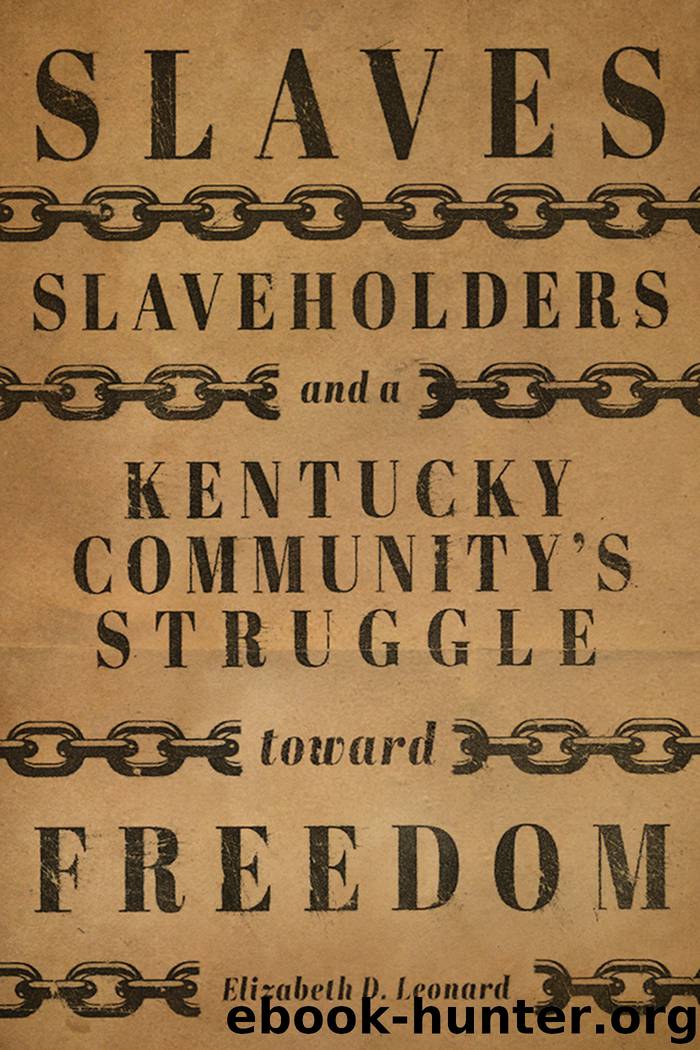Slaves, Slaveholders, and a Kentucky Community's Struggle Toward Freedom by Leonard Elizabeth D

Author:Leonard, Elizabeth D.
Language: eng
Format: epub
Publisher: University Press of Kentucky
Published: 2018-06-13T16:00:00+00:00
Anticipated and Unanticipated Costs of War
Meanwhile, back in Washington, DC, as the war came to an end and federal occupation and Reconstruction began, the persistence, patience, unflinching courage, and undeniable accomplishments of the USCT only strengthened Judge Advocate General Joseph Holt’s dedication to the goals of emancipation and the advancement of black Americans’ civil, human, and political rights generally. In December 1864, along with countless others across the North, Holt had been thrilled to learn of the thousands of USCT soldiers who contributed to the collapse of John Bell Hood’s army at the battle of Nashville. In January 1865, he had applauded Congress’s passage of the Thirteenth Amendment to the US Constitution, which Lincoln then signed and sent out to the states for ratification. On March 3 he welcomed Congress’s establishment of the Freedmen’s Bureau which, like his own Bureau of Military Justice, fell under the authority of the War Department. The department’s main headquarters were located in the Winder Building on 17th Street, not far from the White House, and Judge Advocate General Holt and Freedman’s Bureau Commissioner Oliver Otis Howard almost certainly had regular personal contact there. In the months and years ahead, Holt did what he could to support Howard’s work with his own.
On April 8, 1865, less than a week after Richmond fell and Sandy Holt and the 118th USCT joined other black soldiers in leading the Union forces into the devastated city, Holt traveled from Washington to South Carolina on the steamer Arago with members of the press and a number of other military and civilian dignitaries to participate in the festivities surrounding the restoration of the US flag to its rightful position flying over Fort Sumter. On that occasion, the traveling party included Supreme Court Justice Noah Haynes Swayne, Senator Henry Wilson of Massachusetts, the Reverend Henry Ward Beecher, the great British abolitionist George Thompson—whom Holt had heard speak in Washington earlier in the war—and General Robert Anderson, the hero of Fort Sumter and, like Holt, a Kentuckian. En route to Charleston, Joseph Holt and the others visited Hilton Head, where they observed a colony of approximately three thousand freedpeople at the heart of what came to be known as the “Port Royal experiment.” Abandoned by their owners early in the war, these former slaves had defied gloomy predictions that they would sink into indolence in the absence of the overseer’s lash. Instead, with US army assistance they had planted crops and established a working town, Mitchelville, complete with “a church, schoolhouse, and other such accessories.” “Nothing in the history of Mitchelville,” a writer for the Liberator commented, “lends endorsement to the oft-repeated assertion, that the freedman neither can nor will support himself, much less perform the higher functions of citizenship and fullest freedom.” To the contrary, the settlement proved that with a little help “the freed slave can govern as well as support himself.” Attending the Mitchelville church as a group, Holt and the other dignitaries were impressed as they listened to the
Download
This site does not store any files on its server. We only index and link to content provided by other sites. Please contact the content providers to delete copyright contents if any and email us, we'll remove relevant links or contents immediately.
| African-American Studies | Asian American Studies |
| Disabled | Ethnic Studies |
| Hispanic American Studies | LGBT |
| Minority Studies | Native American Studies |
Cecilia; Or, Memoirs of an Heiress — Volume 1 by Fanny Burney(32558)
The Great Music City by Andrea Baker(32019)
Cecilia; Or, Memoirs of an Heiress — Volume 2 by Fanny Burney(31956)
Cecilia; Or, Memoirs of an Heiress — Volume 3 by Fanny Burney(31942)
We're Going to Need More Wine by Gabrielle Union(19046)
All the Missing Girls by Megan Miranda(16029)
Pimp by Iceberg Slim(14508)
For the Love of Europe by Rick Steves(14121)
Bombshells: Glamour Girls of a Lifetime by Sullivan Steve(14076)
Talking to Strangers by Malcolm Gladwell(13370)
Norse Mythology by Gaiman Neil(13366)
Fifty Shades Freed by E L James(13242)
Mindhunter: Inside the FBI's Elite Serial Crime Unit by John E. Douglas & Mark Olshaker(9343)
Crazy Rich Asians by Kevin Kwan(9292)
The Lost Art of Listening by Michael P. Nichols(7506)
Enlightenment Now: The Case for Reason, Science, Humanism, and Progress by Steven Pinker(7314)
The Four Agreements by Don Miguel Ruiz(6765)
Bad Blood by John Carreyrou(6622)
Weapons of Math Destruction by Cathy O'Neil(6281)
